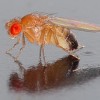Posts tagged brain

Did you know dolphins can stay constantly awake for weeks?
Jun 25th
Young parents and workaholics are very familiar with the effects of sleep deprivation, and almost everyone is agreed – it’s not the most pleasant place to be! Anyone who has ever tried to be, or had to be, awake continuously for several days and nights will know how a stretch of busy time without a nap reduces us to clumsy, incoherent creatures in a daze. But did you know that dolphins have the incredible ability to stay constantly awake – and alert – for more than two weeks? So how do they do that? This is the question Brian Branstetter, a marine More >
Brain size and intelligence- why a human is smarter than a mouse
Nov 13th
“Section through the cerebral cortex of a mouse, stem cells can be seen glowing in green, mature nerve cells in red; cell nuclei for both types of cell are shown in blue.” Source: IMBA
Your brain is a complex, highly organized organ. Each mammalian brain is made of approximately 10-15 billion nerve cells, called neurons. And each brain is built of thousands of different types of neurons, called neuronal subtypes. Neurons have the amazing ability to gather and transmit electrochemical signals, the more neurons the faster signals can be transmitted; think of them like the gates and wires in a computer. More >

Jumping genes in your brain?
Apr 26th
Mobile chunks of DNA that walk their way from one position in the genome to another may affect neurological diseases and could have subtle influences on normal brain function and behavior, according to a recent study in Nature.
Alu is an example of a so-called “jumping gene” – a transposable DNA sequence that “reproduces” by copying itself and inserting into new locations throughout the genome. Alu elements are classified as SINEs, or Short INterspersed Elements. All Alus are approximately 300 bp in length and derive their name from a single recognition site for the restriction enzyme AluI located near the middle of the Alu More >

Mapping the migratory patterns of……brain cancer cells?
Jan 18th
We’ve all watched fascinating David Attenborough documentaries about the migratory patterns of birds, sub-Saharan animals and butterflies, but cancer cells? Yes, cancer cells migrate too. More specifically, brain cancer cells.
Researchers have known for a while that not only are glioblastoma multiforme cells highly resistant to chemotherapy, but they can also deftly migrate away from sites of radiation or surgery, setting up camp and regrowing in other parts of the brain. This means that brain cancer is notoriously difficult to treat and the prognosis is almost always grim.
Last year the New York Times described Hanahan and Weinberg’s Hallmarks of Cancer as follows:
“Through a More >

Model Organisms
Oct 12th
I asked a group of 5th graders the other day whether or not we can learn anything from studying other living things. For example, if we mutate or change the DNA of another organism, like fruit flies (D. melanogaster), can we learn anything about what can happen when human DNA changes? For this particular class, it seemed to be an absolutely absurd question. This could have been because the thought of fruit flies made them ill right before lunch, or they were unsure about how much we have in common with fruit flies.
So we got into a discussion about model More >

Will insulin come to the rescue of AD patients?
Sep 27th
Alzheimer disease (AD) is a neurodegenerative disease of the brain that is divided into early- and late-onset groups. AD is characterized by the build up of amyloid plaques, neurofibrillary tangles and the loss of connections between neurons. It is the most common type of dementia especially in the elderly. The exact causes of AD are elusive at the moment but are most likely the result of genetics and other factors. Scientist have been working hard to identify individual and or groups of genes responsible for the disease. Although the scientific community has identified may genes involved in early and late More >

Brain tumors snack on cholesterol
Sep 19th
Researchers at the University of California Los Angeles and Ohio State University Comprehensive Cancer Center are investigating a new treatment for glioblastoma, the deadliest form of brain cancer. Their paper, out this week in Cancer Discovery, shows how blocking a mechanism involved in cell metabolism and triggered by a cancer gene can reduce brain tumors.
Glioblastoma affects about 18,500 Americans each year, with less than More >

The Dozing Brain
Aug 8th
Do you know people who swear that they can live on a few hours of sleep a night and be able to fully function the next day? Perhaps you’re one of these people. Well it seems that you really can’t “fully function” on less sleep.
Researchers at the University of Wisconsin- Madison conducted tests with rats that were kept up past their normal bedtime. The rats were given objects to play with to keep them awake. During play, electrodes were implanted in their brains to measure brain activity. The results were interesting.
It seems that sleep does not involve the whole brain at once. More >

Are you listening to me?
Jun 20th
Many of us have probably been accused of not paying attention to what someone is saying to us. I’ve also found it odd (since I can’t recall it happening to me) when I’ve approached someone engaged in a task, and they genuinely seemed not to notice I was there.
In a study published in Attention, Perception, & Psychophysics, a group of researchers have been examining a condition called “Inattentional deafness.” The group from University College London examined study participants’ ability to detect a sound while focusing intently on a task.
When subjects did a simple version of the computer based task, most recalled More >

A New Neurotransmitter (D-Aspartic Acid)
May 13th
In 2011, you would think that neuroscience is focused on discovering answers to high-level questions about the brain; how consciousness arises, how emotions work, what is autism, etc. Although progress is being made in all of those areas, it seems that we still have a great deal to learn about even the most basic components of the brain.
Recently, a group from Naples reports that D-Aspartic acid functions as a neurotransmitter in both a mammal the rats (Rattus norvegicus), and a mollusk (Loligo vulgaris). D-Aspartic acid (D-Asp) has been known to scientists for well over a century. However, its role as a More >
